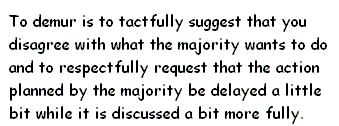MUCH MADNESS IS DIVINEST SENSE
 Much madness is divinest sense --
Much madness is divinest sense --
To a discerning eye --
Much Sense -- the starkest Madness --
'Tis the Majority
In this, as All, prevail --
Assent -- and you are sane --
Demur -- you're straightway dangerous --
And handled with a Chain
Emily Dickinson (1830-1886)
The Individual Versus the Majority: A Reading of Emily Dickinson's
"Much Madness Is Divinest Sense"
 Emily Dickinson never concerned herself much with conforming to the expectations of the community at large. She instinctively understood that the attitudes and opinions of the majority could sometimes be wrong; she also understood that to disagree with the majority can cause the dissenter to be considered mad or -- at the very least -- odd. So, with a pair of paradoxes, the marvelously precise choice of the word demur and the striking image of a madman in chains, Emily captures her insights about the individual versus the majority in one her most familiar poems.
Emily Dickinson never concerned herself much with conforming to the expectations of the community at large. She instinctively understood that the attitudes and opinions of the majority could sometimes be wrong; she also understood that to disagree with the majority can cause the dissenter to be considered mad or -- at the very least -- odd. So, with a pair of paradoxes, the marvelously precise choice of the word demur and the striking image of a madman in chains, Emily captures her insights about the individual versus the majority in one her most familiar poems.

 The first three lines of the poem present a pair of paradoxes which describe the situation in which a perceptive individualist finds himself:
The first three lines of the poem present a pair of paradoxes which describe the situation in which a perceptive individualist finds himself:
Much Madness is divinest Sense --
To a discerning Eye --
Much Sense -- the starkest Madness--
How can "Madness" be "divinest Sense"? How can "Sense" be "starkest Madness"? To "a discerning Eye," that is, to a perceptive individual, much that the world considers insanity actually makes the "divinest" kind of good sense; and much that world considers sane and sensible will strike an intelligent person as the "starkest" kind of madness. As Emily puts it, "the Majority" will always "prevail" over the individual, even when the Majority is wrong. Any perceptive reader can supply examples from history. A "Majority" of sensible Germans, for example, lacked a "discerning eye" to see the profound madness of Hitler's racial and political views, and so that madman was elected Vice-Chancellor of Germany. Millions of Germans gave their "assent" to Hitler and felt they were quite sensible to do so. The handful of perceptive German individualists who disagreed with "the Majority" soon found themselves considered "dangerous" enemies of the State. Of course, Emily lived long before Hitler, but the example makes it clearer what she is talking about. As in so many other cases, the individual must agree with "the Majority" in order to be considered sane.

 Emily's choice of the words demur and assent emphasizes perfectly the position of an intelligent and perceptive individual who sees the madness of "the Majority." To merely agree with or support the Majority is never enough. One must assent. To assent is to express one's agreement or acceptance. It implies that one yields or acquiesces completely and that one approves highly of any proposition to which he assents. To demur means to disagree, but it does not refer to an absolute sort of disagreement. It comes from a Latin word that means to delay or postpone and means "to delay; to pause, to suspend proceedings or judgement because of a doubt or a difficulty." To demur is simply to say: "Hey, fellows! Let's think this thing through and make sure we're doing the right thing." The answer of "the Majority" to the individualist is always the same: "What? We know best! Are you some kind of dangerous nut who needs to be locked up?"
Emily's choice of the words demur and assent emphasizes perfectly the position of an intelligent and perceptive individual who sees the madness of "the Majority." To merely agree with or support the Majority is never enough. One must assent. To assent is to express one's agreement or acceptance. It implies that one yields or acquiesces completely and that one approves highly of any proposition to which he assents. To demur means to disagree, but it does not refer to an absolute sort of disagreement. It comes from a Latin word that means to delay or postpone and means "to delay; to pause, to suspend proceedings or judgement because of a doubt or a difficulty." To demur is simply to say: "Hey, fellows! Let's think this thing through and make sure we're doing the right thing." The answer of "the Majority" to the individualist is always the same: "What? We know best! Are you some kind of dangerous nut who needs to be locked up?"
 Just how much "the Majority" fears and distrusts individualists, just how harsh the punishments of "the Majority" can be, is hinted at by the imagery of the last two lines of the poem:
Just how much "the Majority" fears and distrusts individualists, just how harsh the punishments of "the Majority" can be, is hinted at by the imagery of the last two lines of the poem:
Demur -- you're straightway dangerous --
And handled with a Chain
In Emily's day, persons who were considered dangerously insane were frequently hustled off to places called lunatic asylums. In the early 1800's such places were run by rather crude methods. The patients at most such hospitals were considered violent and dangerous monsters who needed to be kept chained up. The imagery is exaggerated, but it clearly suggests just how much Emily the individualist distrusted and felt threatened by "the Majority."
 In the end, "Much Madness Is Divinest Sense" presents a critique of one of society's basic assumptions. Instead of singing the praises of majority rule, this poem cautions all individualists that dealing with "the Majority" can be very dangerous indeed.
In the end, "Much Madness Is Divinest Sense" presents a critique of one of society's basic assumptions. Instead of singing the praises of majority rule, this poem cautions all individualists that dealing with "the Majority" can be very dangerous indeed.
Much madness is divinest sense --
Emily Dickinson never concerned herself much with conforming to the expectations of the community at large. She instinctively understood that the attitudes and opinions of the majority could sometimes be wrong; she also understood that to disagree with the majority can cause the dissenter to be considered mad or -- at the very least -- odd. So, with a pair of paradoxes, the marvelously precise choice of the word demur and the striking image of a madman in chains, Emily captures her insights about the individual versus the majority in one her most familiar poems.

The first three lines of the poem present a pair of paradoxes which describe the situation in which a perceptive individualist finds himself:
Much Madness is divinest Sense --How can "Madness" be "divinest Sense"? How can "Sense" be "starkest Madness"? To "a discerning Eye," that is, to a perceptive individual, much that the world considers insanity actually makes the "divinest" kind of good sense; and much that world considers sane and sensible will strike an intelligent person as the "starkest" kind of madness. As Emily puts it, "the Majority" will always "prevail" over the individual, even when the Majority is wrong. Any perceptive reader can supply examples from history. A "Majority" of sensible Germans, for example, lacked a "discerning eye" to see the profound madness of Hitler's racial and political views, and so that madman was elected Vice-Chancellor of Germany. Millions of Germans gave their "assent" to Hitler and felt they were quite sensible to do so. The handful of perceptive German individualists who disagreed with "the Majority" soon found themselves considered "dangerous" enemies of the State. Of course, Emily lived long before Hitler, but the example makes it clearer what she is talking about. As in so many other cases, the individual must agree with "the Majority" in order to be considered sane.
Emily's choice of the words demur and assent emphasizes perfectly the position of an intelligent and perceptive individual who sees the madness of "the Majority." To merely agree with or support the Majority is never enough. One must assent. To assent is to express one's agreement or acceptance. It implies that one yields or acquiesces completely and that one approves highly of any proposition to which he assents. To demur means to disagree, but it does not refer to an absolute sort of disagreement. It comes from a Latin word that means to delay or postpone and means "to delay; to pause, to suspend proceedings or judgement because of a doubt or a difficulty." To demur is simply to say: "Hey, fellows! Let's think this thing through and make sure we're doing the right thing." The answer of "the Majority" to the individualist is always the same: "What? We know best! Are you some kind of dangerous nut who needs to be locked up?"
Just how much "the Majority" fears and distrusts individualists, just how harsh the punishments of "the Majority" can be, is hinted at by the imagery of the last two lines of the poem:
Demur -- you're straightway dangerous --In Emily's day, persons who were considered dangerously insane were frequently hustled off to places called lunatic asylums. In the early 1800's such places were run by rather crude methods. The patients at most such hospitals were considered violent and dangerous monsters who needed to be kept chained up. The imagery is exaggerated, but it clearly suggests just how much Emily the individualist distrusted and felt threatened by "the Majority."In the end, "Much Madness Is Divinest Sense" presents a critique of one of society's basic assumptions. Instead of singing the praises of majority rule, this poem cautions all individualists that dealing with "the Majority" can be very dangerous indeed.